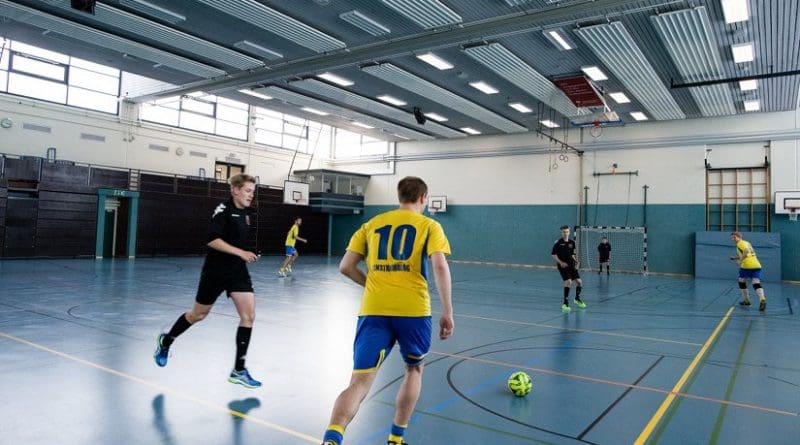Mental Training For Soccer Tactics
It’s not only controlling the ball, physical endurance, and dexterity that matter when it comes to playing soccer. Members of a soccer team also have to be at the top of their game when it comes to tactical strategy. Researchers at the Cluster of Excellence Cognitive Interaction Technology (CITEC) at Bielefeld University have developed a mental training technique that helps soccer players improve their tactical action.
The “kicker” here is that the players can practice with this method without actually being on the playing field.
“In soccer, as in other team sports, all players on the team have to work together harmoniously – especially when it comes to tactical action,” said Professor Dr. Thomas Schack.
The sports scientist and cognitive psychologist specializes in recording how athletes store and recall sequences of action for a game in their memories. He heads the research group “Neurocognition and Action – Biomechanics” and works at the Cluster of Excellence CITEC.
“These days, there is hardly any difference in the physical fitness among soccer players of the same performance class. For this reason, the mental conception of tactical team action can be a decisive advantage.” A tactically experienced team can successfully conceal their real plans from their opponents. This can help them outwit their competitors and determine the very outcome of the game. “The problem is that for many players, tactical team action is stored incorrectly – or not at all – in their memory. We have developed a technique that allows athletes to (re)learn this missing knowledge,” said Schack.
The new method draws upon the athlete’s mental powers of imagination, and was tested with athletes who play futsal, a version of indoor soccer where the ball is passed significantly faster than in standard soccer played on a grass field. In futsal, two teams, each with five players, score by shooting into handball goalposts.
“Our technique is based on photographs and textual explanations of typical tactical situations,” said Dr. Cornelia Frank, a member of Schack’s research group. These photos and textual descriptions allow the players to mentally put themselves in the situation of the game, and imagine their teamwork up to and including successfully scoring a goal. The sports scientist calls the new technique “Joint Action Imagery.”
Dr. Frank and student Gian-Luca Linstromberg have applied and analyzed the method for the first time in a study on participants from a Bielefeld University sports group.
The test subjects were shown a photo with a scene of a tactic being played out, such as a counterattack. They were told to put themselves in the place of a certain player in the picture. As part of this mental positioning, they received an explanation of how the tactical maneuver unfolds from player’s point of view, e.g.: “You intercept the ball on the right side of the field. In front of you is a member of the opposing team, and to the left and right are two players from your team. You speed up, and then pass the ball to the teammate on your right.” Next, the test person was told to vividly imagine the situation ten times in a row. This mental training was practiced for four weeks, along with regular sports training at the gym. Players were led through the mental exercise twice a week, and once a week players went through the training using a script on their own at home.
Futsal players of average experience took part in the study, and a total of 12 players went through the mental training. At both the beginning and end of the study, the researchers measured how well the test subjects mentally internalized the four tactics – playmaking, counterattack, shifting to defense, and pressing. To evaluate this, the test subjects had to make tactical decisions for different game situations. They were shown two different situations at a time and then had to judge whether the same tactic can be used to react to both cases.
“The main finding here is that the mental training enabled the players to better distinguish between the various tactics than before,” said Cornelia Frank. The progress made by the test subjects was compared with a control group of futsal players, who had not participated in the mental training. “The astonishing thing in comparison to the control group was that the players that had practiced the mental training developed functional, that is, proper mental conceptions of the tactics. With this, their mental tactical skills moved towards that of professional players.”
Cornelia Frank will present the new training technique at the end of July during the sports symposium of the Deutschen Vereinigung für Sportwissenschaft (German Association of Sports Sciences, dvs). The symposium will be held together with the conference “Teaching Games for Understanding.” In her conference presentation, Dr. Frank will also go into greater detail on which effects of the mental training should be subject to further research: at this point, it is still unclear whether such training helps players actually make suitable tactical decisions on the playing field.
It also remains to be seen whether the training helps players better understand the tactical instructions given by their coach, or makes them better able to discuss these tactics with the coach and fellow teammates. One thing, however, is clear: “With our method, players learn the basics of soccer strategy, which every coach requires, in a short amount of time. And the players get a better understanding of which tactical approach can be called upon for different situations.”

